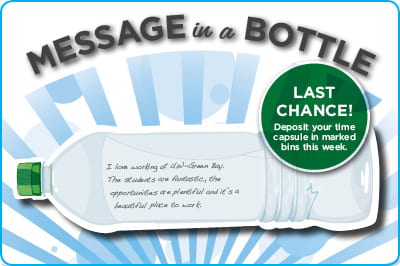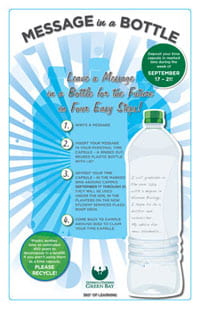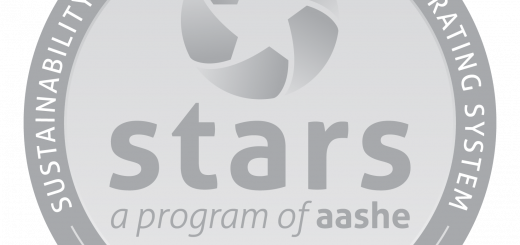Last chance: Leave your message in a bottle
 UW-Green Bay’s sustainability team is hoping the campus community gets — and gives — their “Message in a Bottle.” This is the final week for the personal time capsule campaign involving the new Student Services plaza/roof deck, currently under construction. The “last chance collection bin” will be located on the second floor of the Cofrin Library this week and will be well marked.
UW-Green Bay’s sustainability team is hoping the campus community gets — and gives — their “Message in a Bottle.” This is the final week for the personal time capsule campaign involving the new Student Services plaza/roof deck, currently under construction. The “last chance collection bin” will be located on the second floor of the Cofrin Library this week and will be well marked.
Here’s the history… The plaza project includes a number of large, deep planters — some are so deep that the plants going in them don’t require them all that much soil to thrive. Rather than paying more for soil, UW-Green Bay’s sustainability and facilities management teams will reuse capped plastic bottles collected from recycling bins on campus. The bottles will add the needed volume and won’t decay for a staggering 450 years or so (maybe longer) — which serves as a reminder of what happens (or more accurately, doesn’t happen) when bottles end up in the landfill, rather than the recycling bin.
click to see larger image (pdf)
All they need to do is rinse out a rigid plastic bottle (keeping the cap), let it dry, and then write their “message in a bottle” on a slip of paper — or express it via another medium — to be put inside.
Messages can be anything — campus memories, hopes for the future, a note to future generations, poems or photos.
Drop off your message, and include, if you will, name, age, title, etc. as appropriate, so future University historians will know something about you.
“We’re reusing bottles, avoiding costs for unneeded soil, reinforcing a plastic recycling message and leaving messages from 2012,” Case said. “Future members of the campus community will literally unearth these messages the next time the roof deck undergoes reconstruction — probably 40 or 50 years in the future.”
For more information, email sustainability@uwgb.edu.




